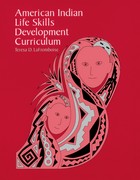
Suicide is a significant problem for many adolescents in Native American Indian populations. American Indian Life Skills Development Curriculum is a course for high school students and some middle school students that is designed to drastically reduce suicidal thinking and behavior.
Created in collaboration with students and community members from the Zuni Pueblo and the Cherokee Nation of Oklahoma, this curriculum addresses key issues in Native American Indian adolescents’ lives and teaches such life skills as communication, problem solving, depression and stress management, anger regulation, and goal setting. The course is unique in its skills-based approach. After first increasing awareness and knowledge of suicide, it then teaches students specific methods to help a peer turn away from suicidal thinking and seek help from an appropriate help-giver.
The skills-based approach of this curriculum follows well-established teaching methods to develop social skills. Teachers and peers inform students of the rationale and components of a particular skill, model and demonstrate the skill for them, and later provide feedback on individual skill performance.
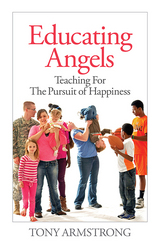
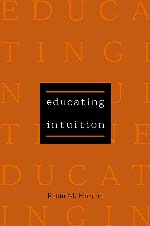
In Educating Intuition, Robin M. Hogarth lays bare this mysterious process so fundamental to daily life by offering the first comprehensive overview of what the science of psychology can tell us about intuition—where it comes from, how it works, whether we can trust it. From this literature and his own research, Hogarth finds that intuition is a normal and important component of thought that has its roots in processes of tacit learning. Environment, attention, experience, expertise, and the success of the scientific method all form part of Hogarth's perspective on intuition, leading him to the surprising—but natural—conclusion that we can educate our sixth sense. To this end he offers concrete suggestions and exercises to help readers develop their intuitive skills and habits for learning the "right" lessons from experience.
Artfully and accessibly combining cognitive science, the latest research in psychology, and Hogarth's own observations, Educating Intuition eschews the vague approach to the topic that has become commonplace and provides instead a wholly engaging and practical guide to enhancing our intuitive skills.
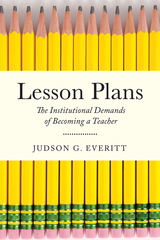
In Lesson Plans, Judson G. Everitt takes readers into the everyday worlds of teacher training, and reveals the complexities and dilemmas teacher candidates confront as they learn how to perform a job that many people assume anybody can do. Using rich qualitative data, Everitt analyzes how people make sense of their prospective jobs as teachers, and how their introduction to this profession is shaped by the institutionalized rules and practices of higher education, K-12 education, and gender. Trained to constantly adapt to various contingencies that routinely arise in schools and classrooms, teacher candidates learn that they must continually try to reconcile the competing expectations of their jobs to meet students’ needs in an era of accountability. Lesson Plans reveals how institutions shape the ways we produce teachers, and how new teachers make sense of the multiple and complicated demands they face in their efforts to educate students.
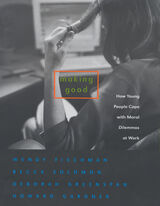
You're young, ambitious, entering the field of your dreams; you're on your own, the competition is fierce--and then you see your chance: the big story, the big role, the big discovery. But you'll have to cut a few corners, bend the rules, cheat a bit. What choices will you make?
After studying more than a hundred young people launching their careers, these longtime researchers of "good work"--work that is both skillful and honorable--find unsettling answers. Although young workers know what it takes to do good work, they don't always feel they can follow the ethical route. "Later, when I'm successful," is their implicit promise.
Making Good explores the choices confronting young workers who join the ranks of three dynamic professions--journalism, science, and acting--and looks at how the novices navigate moral dilemmas posed by a demanding, frequently lonely, professional life. The authors also uncover striking comparisons between these young professionals and the veterans in their fields--most notably, older workers recall inspiring models and mentors, while today's beginners see themselves as on their own. With extensive insights into how young workers view their respective domains, the nature of their ambitions, the sacrifices they are willing to make, and the lines they are prepared to cross, this study will prove instructive to young employees and employers alike, as well as to those who wish to understand the shifting moral and social character of the working world.
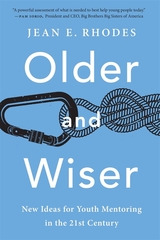
Youth mentoring programs must change in order to become truly effective. The world’s leading expert shows how.
Youth mentoring is among the most popular forms of volunteering in the world. But does it work? Does mentoring actually help young people succeed? In Older and Wiser, mentoring expert Jean Rhodes draws on more than thirty years of empirical research to survey the state of the field. Her conclusion is sobering: there is little evidence that most programs—even renowned, trusted, and long-established ones—are effective. But there is also much reason for hope.
Mentoring programs, Rhodes writes, do not focus on what young people need. Organizations typically prioritize building emotional bonds between mentors and mentees. But research makes clear that effective programs emphasize the development of specific social, emotional, and intellectual skills. Most mentoring programs are poorly suited to this effort because they rely overwhelmingly on volunteers, who rarely have the training necessary to teach these skills to young people. Moreover, the one-size-fits-all models of major mentoring organizations struggle to deal with the diverse backgrounds of mentees, the psychological effects of poverty on children, and increasingly hard limits to upward mobility in an unequal world.
Rhodes doesn’t think we should give up on mentoring—far from it. She shows that evidence-based approaches can in fact create meaningful change in young people’s lives. She also recommends encouraging “organic” mentorship opportunities—in schools, youth sports leagues, and community organizations.

Winner of the Eleanor Maccoby Book Award
“This engaging and well-written book is a significant advance in our understanding of when and how mentoring matters…[It] lays the foundations for an approach to mentoring that is both rigorous and rich in new ideas.”
—Robert D. Putnam, author of Our Kids: The American Dream in Crisis
“Rhodes forces us to slam the brakes on ineffective practices and improve an industry that is devoted to the potential of our nation’s children…The author’s concrete recommendations will create new pathways to opportunity for youth in greatest need.”
—Michael D. Smith, Executive Director, My Brother’s Keeper Alliance
“A powerful assessment of what is needed to best help young people today.”
—Pam Iorio, President and CEO, Big Brothers Big Sisters of America
Youth mentoring is one of the most popular forms of volunteering in the world today, but does it work? Drawing on over thirty years of research and her own experience in the field, Jean Rhodes reveals that most mentoring programs fail to deliver what young people actually need. Many prioritize building emotional bonds between mentors and mentees. But research shows that effective programs go far beyond this, developing specific social, emotional, and intellectual skills.
Most mentoring programs rely on volunteers, who rarely have the training to teach these skills. Their one-size-fits-all models struggle to meet the diverse needs of mentees, and rarely take account of the psychological effects of poverty on children. Rhodes doesn’t think we should give up on mentoring—far from it. Instead, she recommends “organic” mentorship opportunities—in schools, youth sports leagues, and community organizations—and shares specific approaches that can spark meaningful change in young people’s lives.
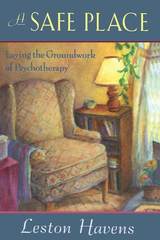
READERS
Browse our collection.
PUBLISHERS
See BiblioVault's publisher services.
STUDENT SERVICES
Files for college accessibility offices.
UChicago Accessibility Resources
home | accessibility | search | about | contact us
BiblioVault ® 2001 - 2024
The University of Chicago Press









